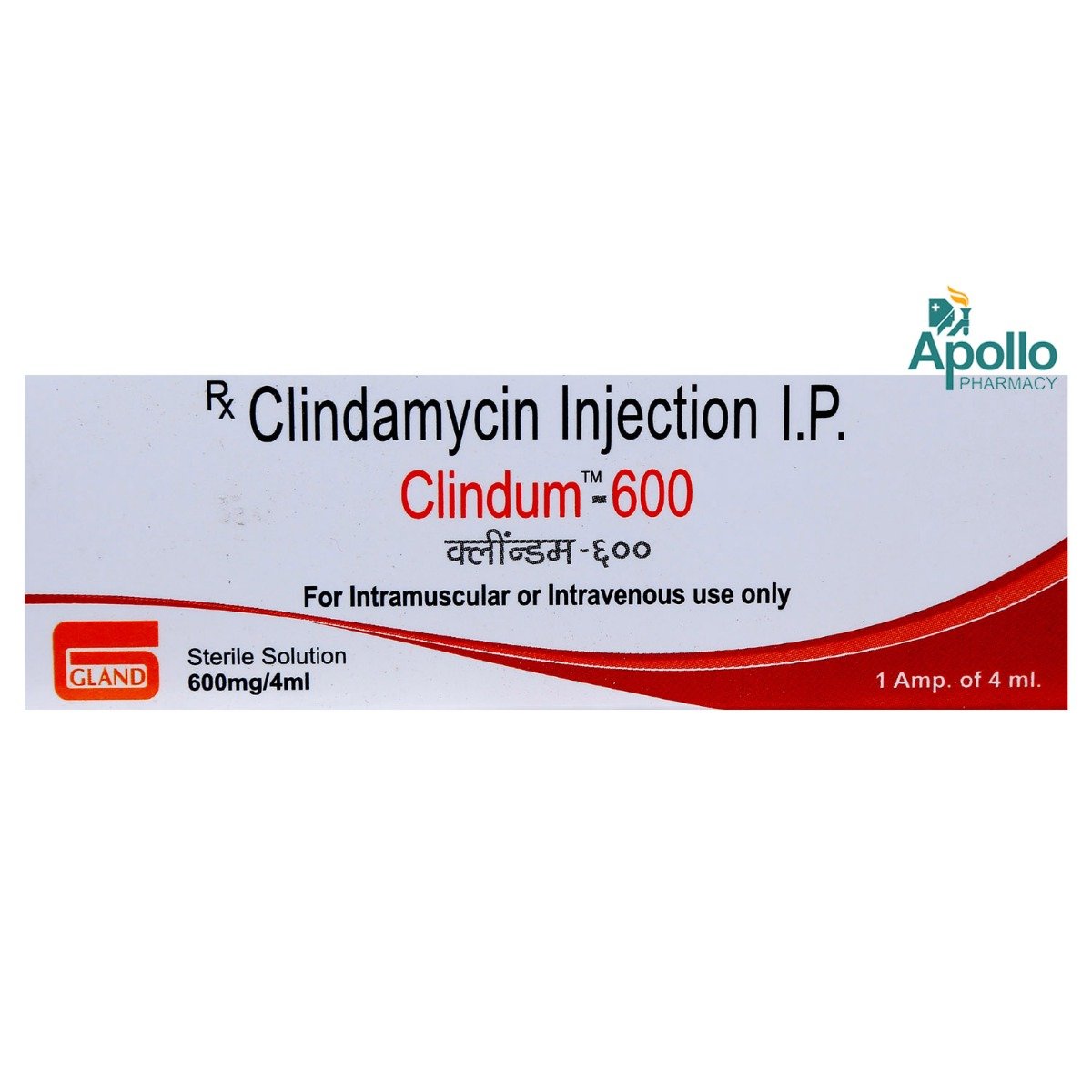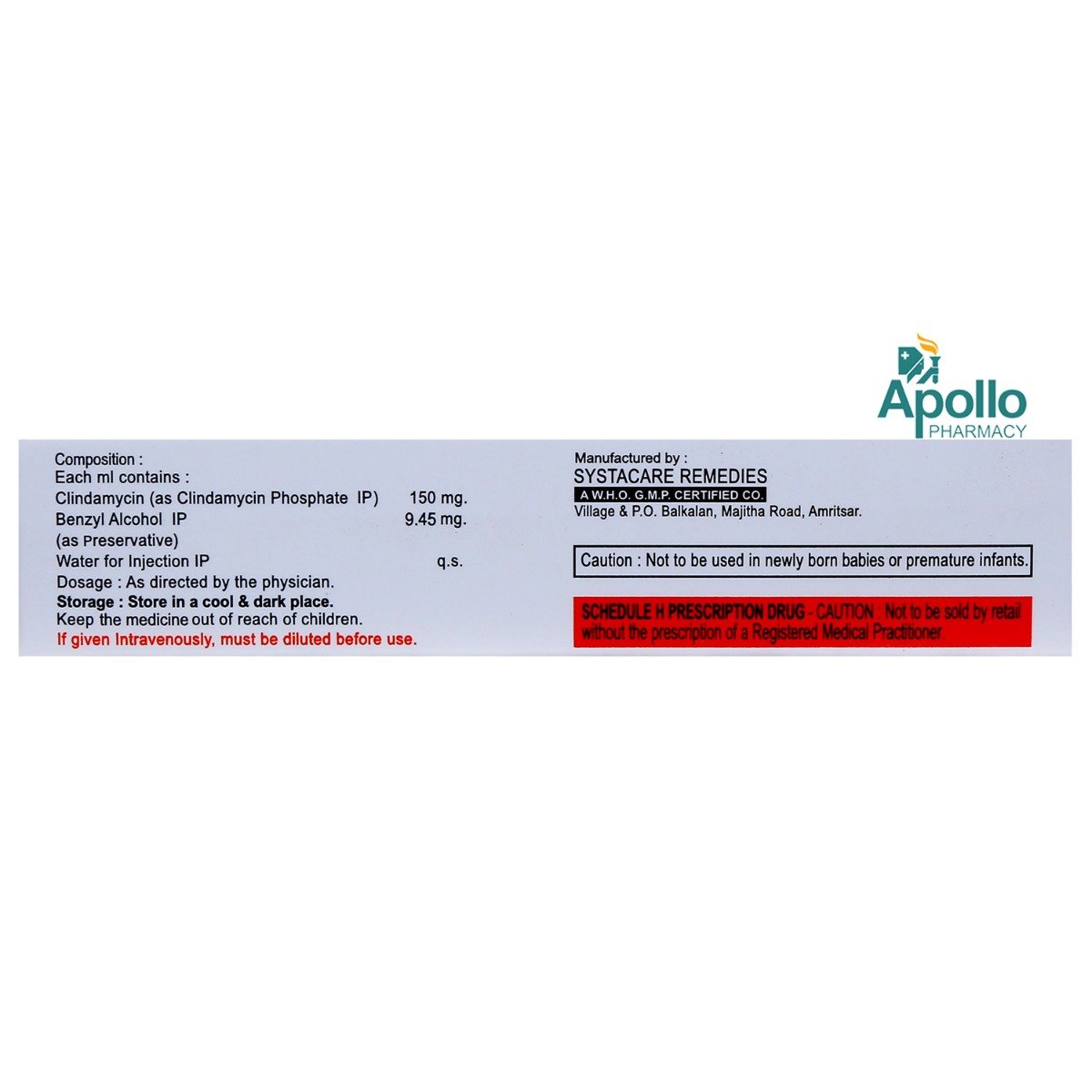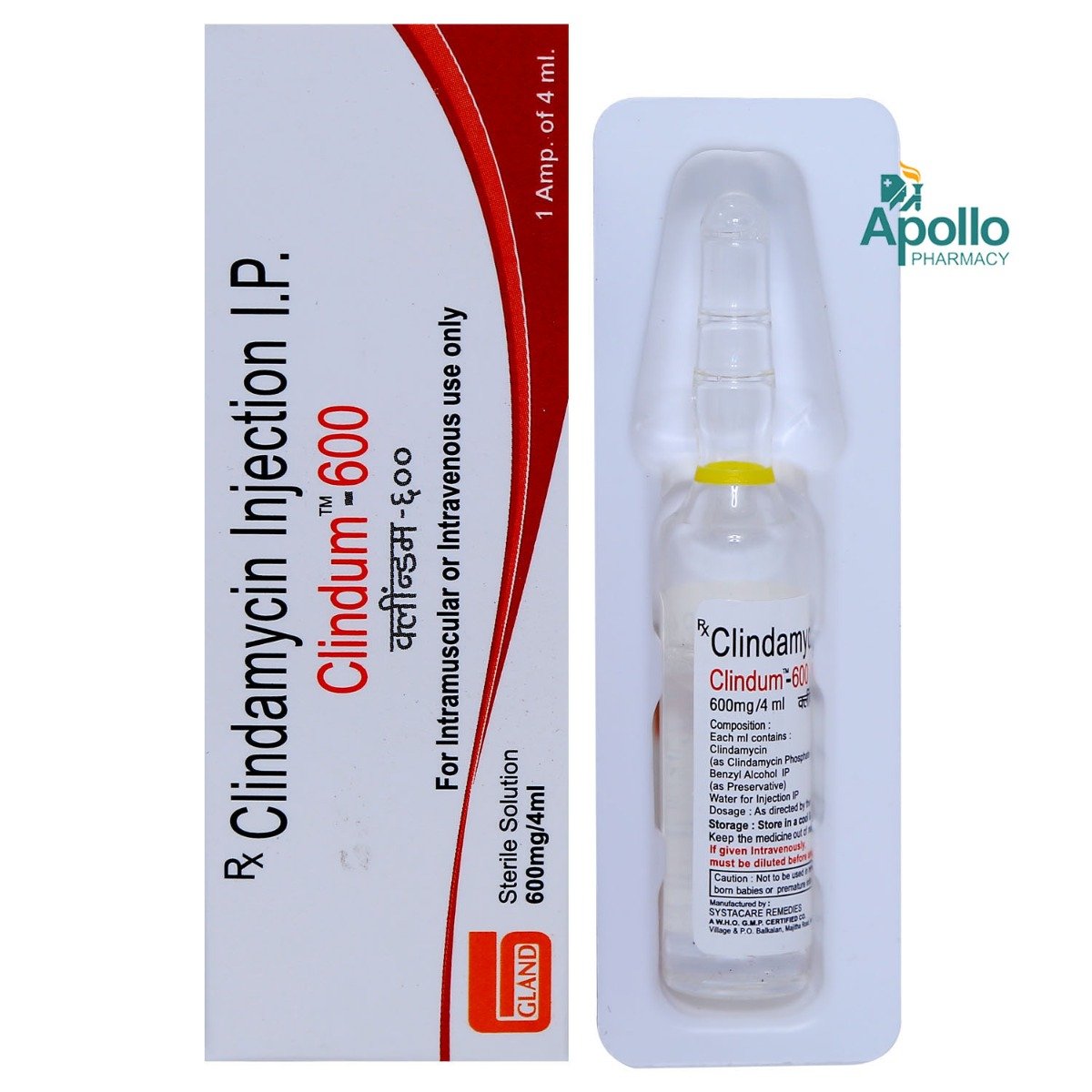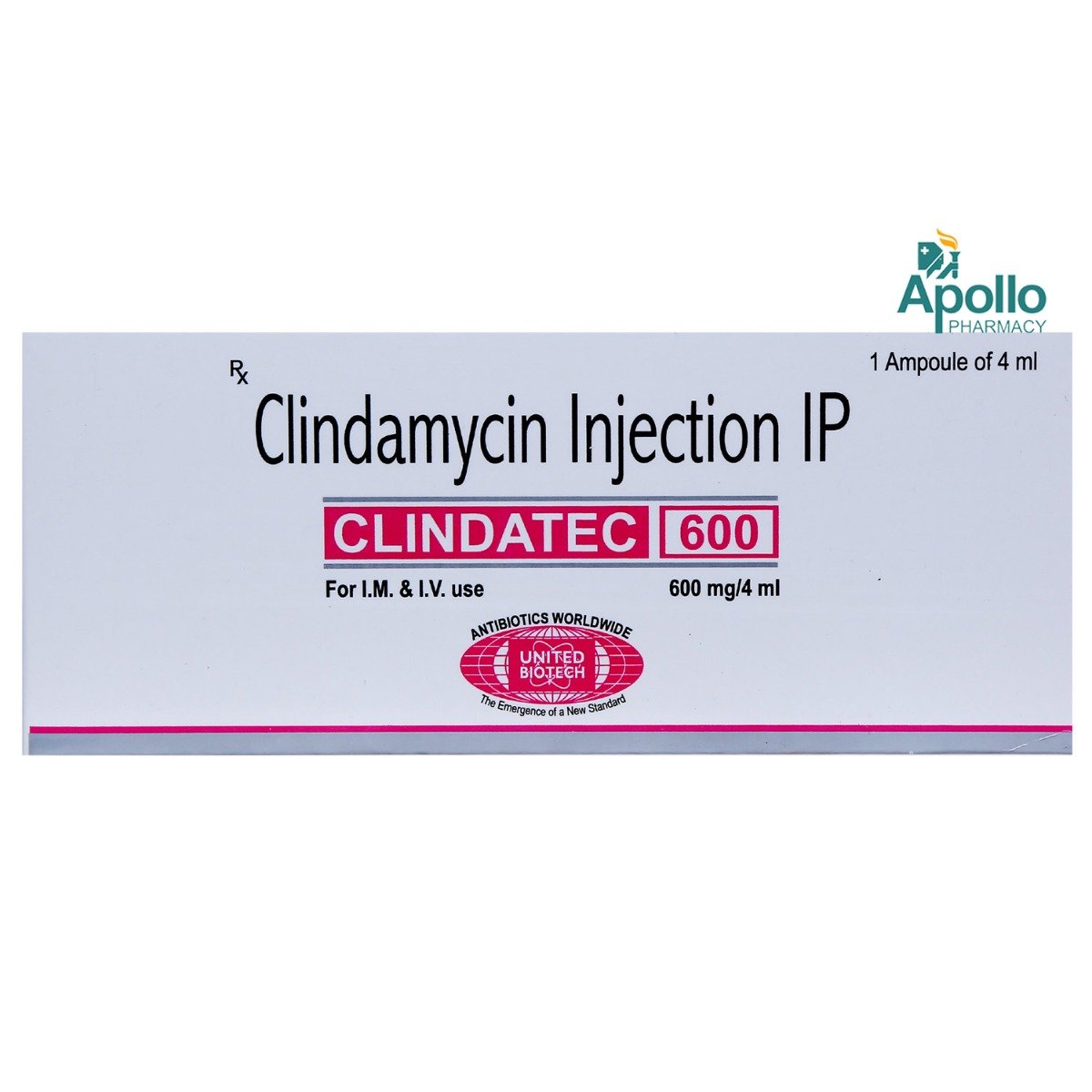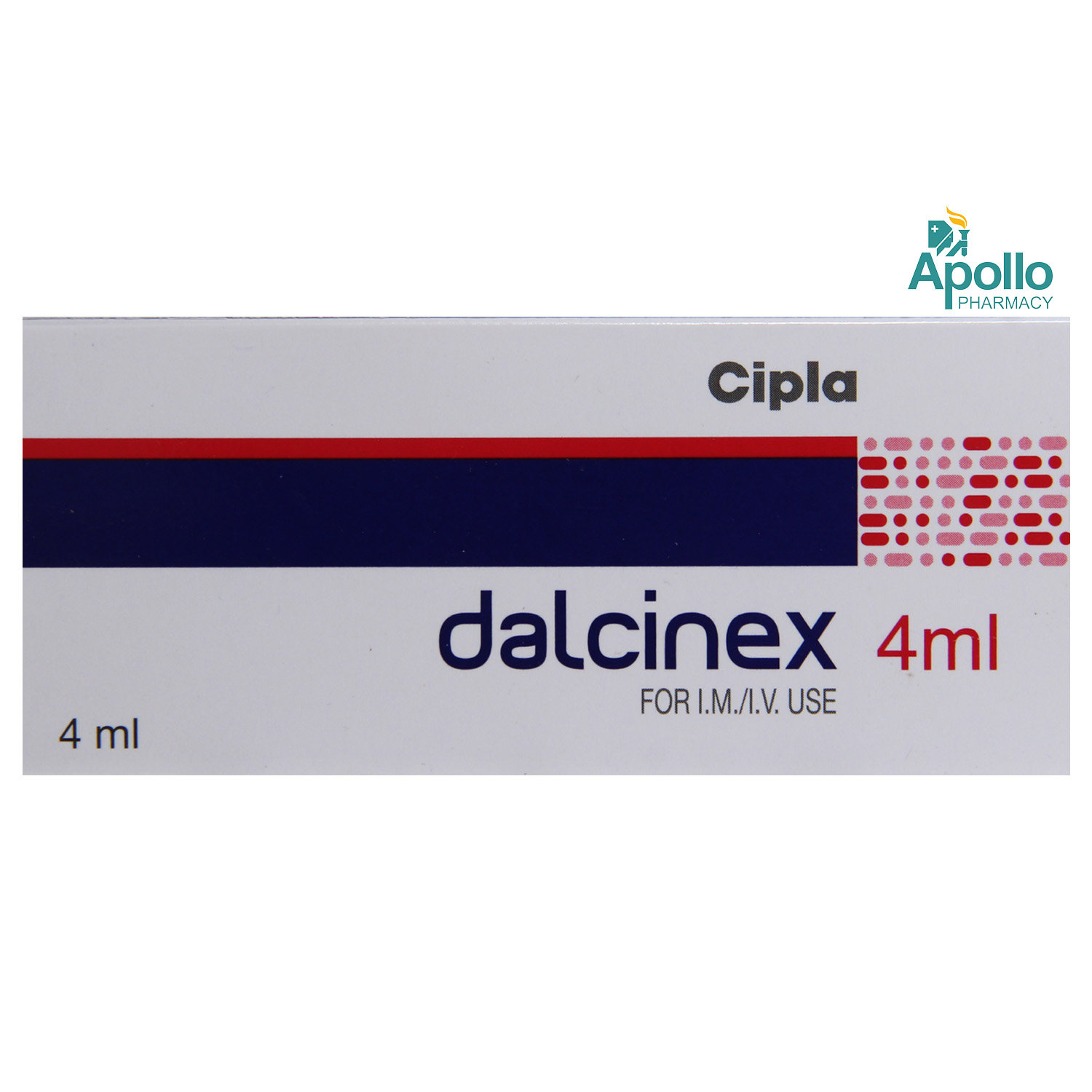Clindum 600mg Injection 4ml
MRP ₹297
(Inclusive of all Taxes)
₹44.5 Cashback (15%)
Provide Delivery Location
Online payment accepted
 Prescription drug
Prescription drugWhats That
Composition :
Manufacturer/Marketer :
Consume Type :
Expires on or after :
Return Policy :
About Clindum 600mg Injection 4ml
Clindum 600mg Injection 4ml belongs to the class of 'antibiotics', primarily used to treat serious bacterial infections such as lower respiratory tract infections like pneumonia, empyema, and lung abscess; gynaecological infections like endometritis, nongonococcal tubo-ovarian abscess, pelvic cellulitis, and postsurgical vaginal cuff infection; intra-abdominal infections; septicaemia or sepsis (blood poisoning by bacteria), and bone and joint infections. Bacterial infection occurs when harmful bacteria grow in the body and causes illness. It can infect any part of the body and multiply very quickly.
Clindum 600mg Injection 4ml contains 'Clindamycin' that works by preventing bacterial protein synthesis, leading to the inhibition of bacterial growth. It shows a bacteriostatic effect that stops bacterial reproduction. Clindum 600mg Injection 4ml effectively treats infections caused by gram-positive and anaerobic (living without air) bacteria, including susceptible strains of Staphylococcus aureus, Streptococcus pneumoniae, and Clostridium perfringens.
Clindum 600mg Injection 4ml will be administered by a healthcare professional. Clindum 600mg Injection 4ml may cause side effects, although not everybody gets them. Common side effects of Clindum 600mg Injection 4ml include stomach pain, nausea, vomiting, diarrhoea, heartburn, skin rash, pain and swelling at the injection site, and vaginal itching or discharge. Most of these side effects do not require medical attention and gradually resolve over time. If these side effects persist longer, please consult your doctor.
Brief your medical history to the doctor if you are allergic to any of the components in Clindum 600mg Injection 4ml. Let your doctor know if you have any liver disease, kidney disease, yellow food dye allergy, colitis (colon inflammation), severe stomach cramps, diarrhoea, and allergic conditions (asthma, hay fever, eczema). Do not use Clindum 600mg Injection 4ml while getting vaccinated with live bacterial vaccines (typhoid vaccine) since Clindum 600mg Injection 4ml may affect the vaccine's activity. Clindum 600mg Injection 4ml should be used only with a doctor's advice during pregnancy and breastfeeding.
Uses of Clindum 600mg Injection 4ml
Directions for Use
Key Benefits
Clindum 600mg Injection 4ml is an antibiotic that treats severe/serious bacterial infections. It works by inhibiting bacterial protein synthesis, which inhibits bacterial growth. It shows a bacteriostatic effect, which stops bacterial reproduction but doesn't kill them. Clindum 600mg Injection 4ml effectively treats infections caused by gram-positive and anaerobic (living without air) bacteria, including susceptible strains of Staphylococcus aureus, Streptococcus pneumoniae, and Clostridium perfringens. Clindum 600mg Injection 4ml is useful in treating lower respiratory tract infections like pneumonia, empyema, and lung abscess; gynaecological infections like endometritis, nongonococcal tubo-ovarian abscess, pelvic cellulitis, and postsurgical vaginal cuff infection; intra-abdominal infections; septicaemia or sepsis (blood poisoning by bacteria), and bone and joint infections.
Storage
- Take cold water baths avoiding soap.
- Avoid scratching and scrubbing to prevent infections while itching.
- Use nets to prevent insects and mosquitoes.
- Stop using lotions and creams that cause irritation.
- Avoid alcohol and caffeine intake.
- Abnormal liver function requires immediate medical attention. Your doctor may recommend lifestyle modifications along with needed medication.
- Avoid intake of alcohol as it has a direct impact on liver functioning.
- Prevent medications like paracetamol, over-the-counter painkillers or those mentioned by your doctor, as they may have issues getting metabolised in your body.
- If you have overweight issues, losing weight can be a good thing to manage abnormal liver function.
- Cut down the number of fatty foods that are taken daily.
- Inform Your Doctor: Notify your doctor immediately about your diarrhoea symptoms. This allows them to adjust your medication or provide guidance on managing side effects.
- Stay Hydrated: Drink plenty of fluids to replace lost water and electrolytes. Choose water, clear broth, and electrolyte-rich drinks. Avoid carbonated or caffeinated beverages to effectively rehydrate your body.
- Follow a Bland Diet: Eat easy-to-digest foods to help firm up your stool and settle your stomach. Try incorporating bananas, rice, applesauce, toast, plain crackers, and boiled vegetables into your diet.
- Avoid Trigger Foods: Steer clear of foods that can worsen diarrhoea, such as spicy, fatty, or greasy foods, high-fibre foods, and dairy products (especially if you're lactose intolerant).
- Practice Good Hygiene: Maintain good hygiene to prevent the spread of infection. To stay healthy, wash your hands frequently, clean and disinfect surfaces regularly, and avoid exchanging personal belongings with others.
- Take Anti-Diarrheal Medications: If your doctor advises, anti-diarrheal medications such as loperamide might help manage diarrhoea symptoms. Always follow your doctor's directions.
- Keep track of your diarrhoea symptoms. If they don't get better or worse or are accompanied by severe stomach pain, blood, or dehydration signs (like extreme thirst or dark urine), seek medical help.
- Drink water or other clear fluids.
- To prevent worsening of pain, limit intake of tea, coffee, or alcohol.
- Include bland foods like rice, toast, crackers, and rice in your diet.
- Avoid lying down immediately after eating as it may cause indigestion or heartburn.
- Avoid acidic and spicy food as it may cause indigestion.
- If you experience low blood pressure symptoms like dizziness, lightheadedness, or fainting while taking medication, seek immediate medical attention.
- Make lifestyle modifications and adjust your medication regimen under medical guidance to manage low blood pressure.
- As your doctor advises, regularly check your blood pressure at home. Record your readings to detect any changes and share them with your doctor.
- Fluid intake plays a vital role in managing blood pressure by maintaining blood volume, regulating blood pressure, and supporting blood vessel function. Drinking enough fluids helps prevent dehydration, maintain electrolyte balance, and regulate fluid balance.
- Take regular breaks to sit or lie down if you need to stand for long periods.
- When lying down, elevate your head with extra pillows to help improve blood flow.
- Avoid heavy exercise or strenuous activities that can worsen low blood pressure.
- Wear compression socks as your doctor advises to enhance blood flow, reduce oedema, and control blood pressure.
- If symptoms persist or worsen, or if you have concerns about your condition, seek medical attention for personalized guidance and care.
Drug Warnings
Do not use Clindum 600mg Injection 4ml if you are allergic to any of its components. Let your doctor know if you have any liver or kidney diseases, gastrointestinal diseases (colitis, Clostridium difficile-associated diarrhoea), yellow food dye allergy, and allergic conditions (asthma, hay fever, eczema). Do not use Clindum 600mg Injection 4ml while getting vaccinated with live bacterial vaccines (typhoid vaccine) since Clindum 600mg Injection 4ml may affect the vaccine's activity. Pregnant and breastfeeding women should consult their doctor before taking Clindum 600mg Injection 4ml. Avoid alcohol consumption to prevent any undesired effects while using Clindum 600mg Injection 4ml.
Drug-Drug Interactions
Drug-Drug Interactions
Login/Sign Up
Taking Clindum 600mg Injection 4ml with Botulinum toxin can increase the risk or severity of side effects.
How to manage the interaction:
Taking Clindum 600mg Injection 4ml with Botulinum toxin together can result in an interaction, they can be taken together if prescribed by a doctor. However, if you experience any unusual symptoms contact a doctor immediately. Do not discontinue any medications without consulting a doctor.
Taking Clindum 600mg Injection 4ml with clarithromycin may increase the effects of Clindum 600mg Injection 4ml.
How to manage the interaction:
Although there is a possible interaction, Clindum 600mg Injection 4ml can be taken with clarithromycin if prescribed by the doctor. Consult the prescriber if you experience persistent vomiting, nausea, abdominal pain, or diarrhea. Do not discontinue the medication without consulting a doctor.
Concomitant use of Clindum 600mg Injection 4ml with indinavir may increase the effects of Clindum 600mg Injection 4ml.
How to manage the interaction:
Although there is a possible interaction, Clindum 600mg Injection 4ml can be taken with indinavir if prescribed by the doctor. Consult the prescriber if you experience persistent vomiting, nausea, abdominal pain, or diarrhoea.
Co-administration of Boceprevir together with Clindum 600mg Injection 4ml can increase the effects of Clindum 600mg Injection 4ml.
How to manage the interaction:
Although there is a possible interaction between Clindum 600mg Injection 4ml and Boceprevir, you can take these medicines together if prescribed by your doctor. If you have ongoing feelings of sickness, throwing up, having loose stools, or pain in your stomach, it's important to contact your doctor right away. Do not stop using any medications without a doctor's advice.
When Clindum 600mg Injection 4ml is taken with Fosphenytoin, it can cause the body to process Clindum 600mg Injection 4ml faster.
How to manage the interaction:
Although there is a possible interaction between Clindum 600mg Injection 4ml and Fosphenytoin, you can take these medicines together if prescribed by your doctor. If you notice any symptoms like sudden drowsiness, fatigue, confusion, itching, burning, or tingling sensation, abnormal body movements, or loss of coordination, make sure to contact your doctor right away. Do not stop using any medications without first talking to your doctor.
Coadministration of use of Clindum 600mg Injection 4ml with ketoconazole can increase the effects of Clindum 600mg Injection 4ml.
How to manage the interaction:
Although there is a possible interaction, Clindum 600mg Injection 4ml can be taken with ketoconazole if prescribed by the doctor. Consult the prescriber if you experience persistent vomiting, nausea, abdominal pain or diarrhea. Do not discontinue any medication without consulting a doctor. Do not discontinue any medication without consulting a doctor.
When taken in combination, Clindum 600mg Injection 4ml can lower the amount or action of estradiol.
How to manage the interaction:
Co-administration of Estradiol with Clindum 600mg Injection 4ml can result in an interaction, but it can be taken if a doctor has advised it. Do not stop using any medications without a doctor's advice.
Co-administration of Clindum 600mg Injection 4ml with Bacitracin may increase the risk of kidney and/or nerve damage.
How to manage the interaction:
Although there is a possible interaction, Clindum 600mg Injection 4ml can be taken with bacitracin if prescribed by the doctor. Consult the prescriber if you experience signs and symptoms of kidney damage such as sudden weight gain or weight loss, nausea, vomiting, fluid retention, loss of appetite, increased or decreased urination, swelling, shortness of breath, muscle cramps, tiredness, weakness, dizziness, confusion, and irregular heart rhythm. Let your doctor know if you develop seizures; hearing problems; or numbness, burning or tingling in your hands and feet. If you develop diarrhoea or vomiting during treatment with these medications, drink plenty of fluids to prevent dehydration, as dehydration may harm the kidney.
Co-administration of Clindum 600mg Injection 4ml may reduce the activity of the cholera vaccine.
How to manage the interaction:
Talk to your doctor before receiving the Cholera vaccine if you are currently being treated with Clindum 600mg Injection 4ml or have been treated within the last 14 days. To ensure adequate vaccine response, you should not receive cholera vaccine until at least 14 days after you complete antibiotic therapy. Do not discontinue the medication without consulting a doctor.
Co-administration of Clindum 600mg Injection 4ml with Atracurium can increase the risk of muscle weakness.
How to manage the interaction:
Taking Clindum 600mg Injection 4ml with Atracurium together can possibly result in an interaction, but it can be taken if a doctor has advised it. "Clindum 600mg Injection 4ml can affect the muscles and nerves in your body. When used with other medications that also affect the muscles and nerves, it can cause a serious problem called neuromuscular blockade. If you have trouble breathing or can't breathe at all, please call your doctor right away." Do not stop using any medications without a doctor's advice.
Drug-Food Interactions
Drug-Food Interactions
Login/Sign Up
Diet & Lifestyle Advise
- Wash your hands often to maintain cleanliness.
- Avoid sharing personal items like shaving razors.
- Include whole-grain foods like multigrain bread and brown rice in your diet.
- Taking probiotics after an antibiotic treatment reduces the risk of antibiotic-associated diarrhoea.
- Try taking yoghurt, cheese, sauerkraut, and kimchi that help restore the intestine's good bacteria.
- Include more fibre-enriched food in your diet that is easily digested by your gut bacteria. Fibre foods may also help restore healthy gut bacteria after a course of antibiotics.
- Avoid intake of alcoholic beverages as it may cause dehydration and affect your sleep.
- Manage stress, eat healthily, drink plenty of water, exercise regularly, and get plenty of sleep.
Side Effects of Clindum 600mg Injection 4ml
- Pain and swelling at the injection site
- Stomach pain
- Nausea
- Vomiting
- Diarrhoea
- Heartburn
- Skin rash
- Vaginal itching or discharge
Habit Forming
Therapeutic Class
All Substitutes & Brand Comparisons
RX
Out of StockBraclin 600mg Injection
₹146
(₹32.85/ 1ml)
50% CHEAPERRX
Out of StockClinmet 600 Injection
Metlar Formulations
₹215.4
(₹48.47/ 1ml)
27% CHEAPERRX
Out of StockCliden 600 mg Injection 4 ml
Leechem Biotech Pvt Ltd
₹249
(₹56.03/ 1ml)
16% CHEAPER
Author Details
We provide you with authentic, trustworthy and relevant information
Drug-Diseases Interactions
Drug-Diseases Interactions
Login/Sign Up
Almost all antibacterial medications have been associated with reports of Clostridioides difficile-associated diarrhoea (CDAD), formerly known as pseudomembranous colitis. It can vary from mild diarrhoea to deadly colitis.
How to manage the interaction:
Clostridioides difficile-associated diarrhea (CDAD) ranging from mild diarrhoea to colitis has been reported during treatment with antibacterial agents. Therapy should be administered cautiously in patients with history of gastrointestinal disease, particularly colitis and pseudomembranous colitis. Appropriate fluid and electrolyte management, protein supplementation, and antibacterial treatment of C difficile is advised.
Benzyl alcohol is frequently used as a preservative in the formulation of multidose vials for parenteral medicines. Manufacturers of pharmaceuticals believe that using them in neonates, especially preterm and underweight newborns, is contraindicated. In low birth weight preterm newborns, the use of benzyl alcohol in bacteriostatic saline intravascular flush and endotracheal tube lavage solutions has been linked to mortality and serious respiratory and metabolic problems.
How to manage the interaction:
Parenteral medications containing benzyl alcohol as a preservative are contraindicated in neonates, particularly premature infants and infants of low birth weight.
The liver is the primary site of Clindum 600mg Injection 4ml metabolism. Patients with significantly impaired hepatic function may have a rise in the blood concentration of Clindum 600mg Injection 4ml and a prolongation of the half-life. Additionally, the drug's usage may result in abnormal liver enzyme levels and jaundice. Patients with liver problems should receive Clindum 600mg Injection 4ml therapy with caution. When given every 8 hours, dosage modifications might not be required. However, with high-dose therapy, serum concentrations should be observed, and during prolonged therapy, regular liver function tests should be carried out.
How to manage the interaction:
Clindum 600mg Injection 4ml is primarily metabolized by the liver. Therapy with Clindum 600mg Injection 4ml should be administered cautiously in patients with liver disease. Serum concentrations should be monitored during high-dose therapy, and periodic liver function tests should be performed during prolonged therapy.
Clindum 600mg Injection 4ml is partially removed by the kidney. Clindum 600mg Injection 4ml should be used with caution in individuals with significantly impaired renal function. Dosage changes are probably to be required. Serum Clindum 600mg Injection 4ml concentrations should be monitored throughout high-dose therapy, and renal function tests should be conducted on a regular basis during extended medication.
How to manage the interaction:
Therapy with Clindum 600mg Injection 4ml should be administered cautiously in patients with severely impaired renal function. Serum Clindum 600mg Injection 4ml concentrations should be monitored during high-dose therapy, and periodic renal function tests should be performed during prolonged therapy.
Clindum 600mg Injection 4ml is partially removed by the kidney. Clindum 600mg Injection 4ml should be used with caution in individuals with significantly impaired renal function. Dosage changes are probably to be required. Serum Clindum 600mg Injection 4ml concentrations should be monitored throughout high-dose therapy, and renal function tests should be conducted on a regular basis during extended medication.
How to manage the interaction:
Therapy with Clindum 600mg Injection 4ml should be administered cautiously in patients with severely impaired renal function. Serum Clindum 600mg Injection 4ml concentrations should be monitored during high-dose therapy, and periodic renal function tests should be performed during prolonged therapy.
FAQs
Drug-Drug Interactions Checker List
- ERYTHROMYCIN
- RIFAMPIN
- ATRACURIUM
- VECURONIUM
Special Advise
- Liver and kidney function monitoring (Liver and kidney function tests) are recommended in patients with severe liver and kidney diseases.
- Clostridium difficile-associated diarrhoea (CDAD) is reported during the usage of antibiotics. Please consult your doctor if you experience prolonged diarrhoea.
Disease/Condition Glossary
Bacterial infection: It occurs when harmful bacteria grow in the body and causes illness. It can infect any part of the body and multiply very quickly. Bacteria may be gram-positive (have a thick cell wall) or gram-negative (do not have a cell wall). Some common symptoms of a bacterial infection include cough, fever, shortness of breath, chills, muscle pain, fatigue, and tiredness. Untreated bacterial infections may lead to serious life-threatening conditions like sepsis.

Have a query?
Alcohol
Safe if prescribed
Avoid taking alcohol while using Clindum 600mg Injection 4ml since it may worsen the side effects.
Pregnancy
Consult your doctor
Please consult your doctor before taking Clindum 600mg Injection 4ml if you are pregnant or planning to conceive.
Breast Feeding
Consult your doctor
Clindum 600mg Injection 4ml can be excreted into breast milk when used by a nursing mother. Please consult your doctor before taking Clindum 600mg Injection 4ml if you are breastfeeding.
Driving
Safe if prescribed
There is limited data on how Clindum 600mg Injection 4ml affects your driving ability. Please seek medical advice for more information.
Liver
Consult your doctor
Let your doctor know if you have any history of liver diseases before taking Clindum 600mg Injection 4ml since it may cause jaundice and abnormal liver function tests.
Kidney
Consult your doctor
Let your doctor know if you have any history of kidney diseases before taking Clindum 600mg Injection 4ml.
Children
Safe if prescribed
Clindum 600mg Injection 4ml should be used in children only when prescribed by a doctor. Your doctor will prescribe Clindum 600mg Injection 4ml depending on the child's age and body weight.

